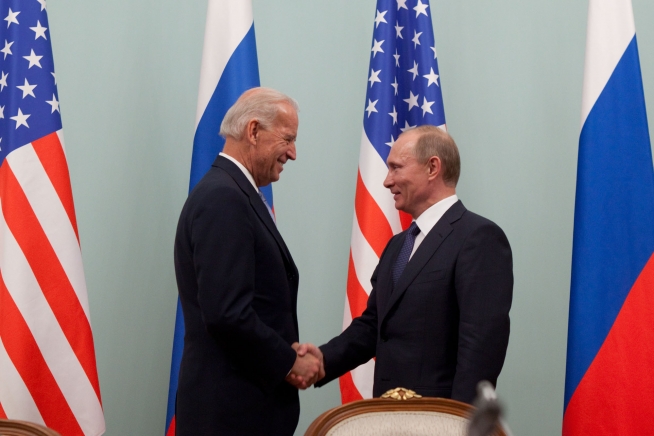 Then Vice President Biden meeting Putin in 2011
Then Vice President Biden meeting Putin in 2011
Topics for Discussion in a Biden-Putin Meeting
As President Biden preps to meet with Russian President Vladimir Putin this week, many are eager to see the results of a meeting that is bound to be more contentious than the one held by President Trump at Helsinki in 2018. Biden’s indication that he intends to deliver a message to Putin raises a number of questions about what that message will be, and whether Putin will actually change his behavior as a result.
While last week’s attention was focused on how many Presidents Queen Elizabeth has met, Biden will be the fifth serving U.S. President for Putin. Both men have decades of experience to help them prepare for this meeting. For Biden, the list of issues to address is long. Below is a short overview of some of topics he may opt to address:
- Cyber hacking has been on the top of everyone’s mind recently, especially with the high-profile ransomware attack on Colonial Pipeline leading to gas shortages across the eastern United States. President Biden has noted the potential progress in Russia’s offer to extradite cyber criminals on a reciprocal basis, but this is fraught with potential pitfalls. Russia’s definition of a cyber criminal may be overly broad, and is likely to include even those who merely oppose Putin’s government through online activities. Biden should outline the consequences of continued ransomware attacks and hacking of American entities by Russia or its citizens.
- Ukraine is somewhat of a fait accompli by the Russians. Russia already holds a firm grasp on Crimea, having executed a rapid and efficient takeover of the region in 2014. Ukraine does not have the military strength to retake this territory, and no diplomatic pressure is likely to cause Russia to leave. The Eastern region of Ukraine remains a tense stand-off, with Ukrainian forces merely holding a line against the potential of further territorial encroachment by Russian-backed forces. Biden needs to discourage Putin from further provocative action, while simultaneously working with Ukraine to boost its own ability to resist Russian pressure.
- Nuclear weapons represent the core risk that both countries pose to one another. With both countries able to completely destroy each other at a moment’s notice, keeping these weapons under control and reducing the risk of their use is critical. For this reason, the U.S. and Russia recently renewed the New START agreement for five years. This provides ample time to begin designing a replacement treaty, and discuss the necessary steps for ensuring that Russia and the U.S. remain on a path towards nuclear reductions and de-escalation.
- Space, while perhaps not the most critical aspect of the U.S-Russian relationship, has been a strong area of cooperation since the U.S. and the Soviet Union began cooperating in the 1970s. As the U.S. is standing up its own commercial crewed space vehicle that will allow the U.S. to ferry its own astronauts to and from the international space station, it will no longer need to rely on Russia to provide this service. Russia has recently threatened to leave the International Space Station, and is planning future moon exploration with China. It would be truly unfortunate to lose such a historically valuable area of cooperation with Russia in an otherwise contentious relationship.
- Syria has been a flashpoint of interaction between U.S. and Russian military forces, as confrontations between the two sides’ militaries have continued into 2021. Neither side will ever agree on what an appropriate future for the country looks like, but Biden should pressure Russia hard on the provocative actions Russian forces have taken against Americans in the country, and work to provide better humanitarian access to civilians.
- Afghanistan has been a subject of historical consternation between the two countries, but both have an interest in preventing the country from becoming a source of international terror again. Aside from the issue Russian bounties for American troops, Biden needs to encourage Putin to come to an understanding over plans for a post-American Afghanistan. Russia’s
- COVID vaccinations are a prime area of potential cooperation between Russia and the United States. While Biden has made a point in recent weeks showing the power of democratic countries to supply the world with vaccines, the apparent effectiveness of Russia’s Sputnik vaccine means that it too should have a role in helping the world beat the pandemic. This needn’t be purely a competition. There is historical precedent for this, as the U.S. and Soviet Union worked together to help eliminate smallpox and polio.
- Democratic interference has been the big story over the past few years with Russia. Although numerous sanctions have been imposed on Russia for these activities since the Trump administration, these have not enjoyed the full rhetorical backing of the executive branch until recently. Biden will need to outline a potentially much more aggressive response to further Russian interference, with the goal of significantly raising the pressure on Putin himself should Russia continue to interfere in America’s democratic systems.
Certainly, the list of issues between the U.S. and Russia are long and robust—a sign that while our countries have many areas of contention, there are also key opportunities for cooperation that should be seized upon. The arctic, climate change, scientific exchange, and many other issues offer areas where our countries can potentially work together in common interest. The meeting between Presidents Biden and Putin may be noteworthy due to the potential for conflict, but we should also be hopeful for areas of agreement as well.





